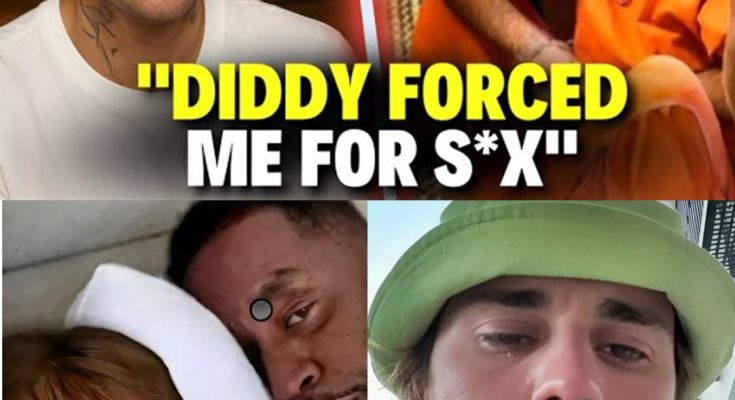In a startling turn ahead of Sean “Diddy” Combs’s trial, pop megastar Justin Bieber has reportedly stepped forward as a key witness—accusing Diddy of misconduct dating back to his early teens. According to insiders and a transcript of recently emerged statements, Bieber alleges that at age 13, he was introduced to Diddy under the guise of mentorship—but circumstances quickly turned exploitative.
Bieber shot to fame with his 2009 debut hit One Time, astounding the music world at just 13. After joining American Idol-style auditions and touring independently, he caught the attention of Usher, who signed him under LaFace Records. Around the same time, Diddy—already a well-known figure in hip-hop—became involved, reportedly taking a custodial role in Bieber’s life.

The Mentorship Turned Allegation
Bieber Subpoenaed Amidst Rising Tension
Usher’s Role Under Scrutiny
In follow-up testimonies, Bieber revealed he eventually distanced himself from Usher, citing mixed feelings about their relationship. Usher’s name has surfaced repeatedly in complaints, including a lawsuit-marked footnote indicating that a major R&B singer who recently headlined the Super Bowl and performed in Las Vegas was embroiled in allegations of misconduct—widely believed to be Usher due to the timeline and public achievements.
“They Don’t Care About People—Only Money”
Bieber reportedly became disillusioned with the adult figures guiding him. In private recordings, he is said to have confronted Diddy, challenging his sincerity and claiming: “You don’t care about people—only money.” According to court observers, Bieber also disclosed that Diddy never gave him the Lamborghini he promised for his 16th birthday—a gift that symbolized trust, guidance, and support.
Footage of a tense exchange captured Bieber’s confusion and disappointment: “We used to hang out a lot, but then you only reached out through business contacts. It became all about money.”
The Fallout: Trauma, Substance Use, and Distance
Following his childhood experiences, Bieber asserted that he struggled with substance use. He was seen during performances looking visibly different—thin, teary, and emotionally fragile. Bieber has publically broken down, supported by his wife Hailey, during emotional performances and interviews.
Terrence Howard, who has worked with Bieber and Usher, publicly stated that both men had suffered abuse within the industry. According to Howard, both rappers and R&B stars like Usher and Bieber confessed they could not escape their early experiences.
Broadening the Spotlight
While much of the court’s attention has centered on Diddy, Bieber’s involvement amplifies allegations of a broader cultural pattern: one in which powerful figures—Usher, Diddy, and others—may have normalized exploitative behavior, trusting in silence and mentorship as camouflage.
Legal filings increasingly reference detailed patterns that align with Bieber’s statements: drugged drinks, coercive gatherings, and a pipeline of trauma from vulnerable trainees.
Shaky Foundations at the Crossroads
Several questions now loom:
What recordings were made, and how are they relevant?
-
- Prosecutors have reportedly obtained encrypted audio capturing parts of a conversation involving Bieber, Diddy, and other high-profile figures. If validated, these could prove critical in demonstrating wrongdoing.
Will Usher be drawn into the legal hearings?
-
- Usher has firmly denied any misconduct and has made no public statements regarding Bieber’s evolving testimony.
Did mentorship cross the line?
- The court must weigh whether these adult figureheads created safe, legal environments—or whether youth support became vehicle for professional aspirations and manipulation.
Bieber’s Statement: Protecting Others
In court documents, Bieber expressed growing concern about protecting then-pop star Billie Eilish and others from similar industry threats. He has listed mentors, managers, and parents, hoping they reflect on the responsibility they hold to shield young artists from giving away dignity in exchange for opportunity.
The Industry Reckoning
The ripple effects of Bieber’s revelations are being felt across music and entertainment:
Mentorship programs in music are being criticized as potential conduits for exploitation.
High-profile reputational damage looms—not just for Diddy but also figures like Usher who facilitated Bieber’s early access.
A Defining Moment
Justin Bieber’s dramatic testimony threatens to redraw not just the lines of this trial, but also the future of artist development in the music industry. Whether he completes his testimony or remains silent on the stand, his testimony—marked by tears, substance struggles, and courtroom revelations—has changed the tenor of this legal battle forever.
As the trial moves forward, one thing is clear: Bieber’s story has shattered the notion that mentorship is always protective. Now, the court—and the public—must reckon with whether fame-seeking environments allow mentorship or perpetuate abuse.
